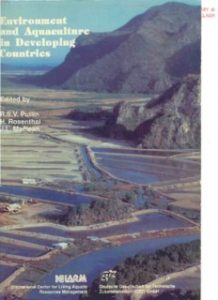Environment and aquaculture in developing countries PDF the resources available to ensure the continuance of life on earth are finite. Any resource can only serve a limited number of purposes at the same time and place. This is particularly true of water which is a fundamental requirement not only for aquatic but also for terrestrial organisms. It similarly applies to nutrients and energy.

Environment and Aquaculture in Developing Countries
With an increasing demand for food: energy and space by a growing population, the pressure of exploitation is reaching alarming levels on an increasing number of species and over an expanding area.
To avoid overexploitation and loss, the resources essential for human survival must be used efficiently and wisely. This requires channeling their utilization in ways that fulfill multiple and complementary objectives wherever possible.
Modern aquaculture appeared at a time when many claims for use of the resources had been made and the competition was growing for those niches still available. Labor was becoming increasingly expensive, leading to intensification in terms of rationalization and mechanization to reduce costs.
This meant higher stocking densities and higher demand for feed and energy. Among the most immediate environmental consequences were overloading of the waters with nutrients, contamination with chemicals for the treatment of diseases and pests, and ecological damage through the installation of voluminous infrastructure.
The demand for feed increased the pressure on other living resources such as small pelagic fish utilized as fishmeal. Most of the more conspicuous mistakes made so far were committed by developed countries.
Some at least could have been avoided through more awareness, foresight, and readiness to renounce fast profits which were both questionable and harmful in the long term. The most important lesson to be learned from the past is more consideration for the need to understand better the environmental and social context in which aquaculture is being developed.
Such a better understanding should then lead to the establishment of a general policy to guide development action in the most promising directions and to keep negative side effects to a minimum.
Disclaimer:- Dev Library is not the owner of the books and neither does it create books. We just provide the links to the book for the rural and poor students who don’t afford to buy books. Those E-Books and Pdfs are already available on the internet. For any reason, if someone thinks that I’m violating any laws or if anyone has any issues regarding this, please feel free to Contact Us.

Hi, I’m Dev Kirtonia, Founder & CEO of Dev Library. A website that provides all SCERT, NCERT 3 to 12, and BA, B.com, B.Sc, and Computer Science with Post Graduate Notes & Suggestions, Novel, eBooks, Biography, Quotes, Study Materials, and more.








